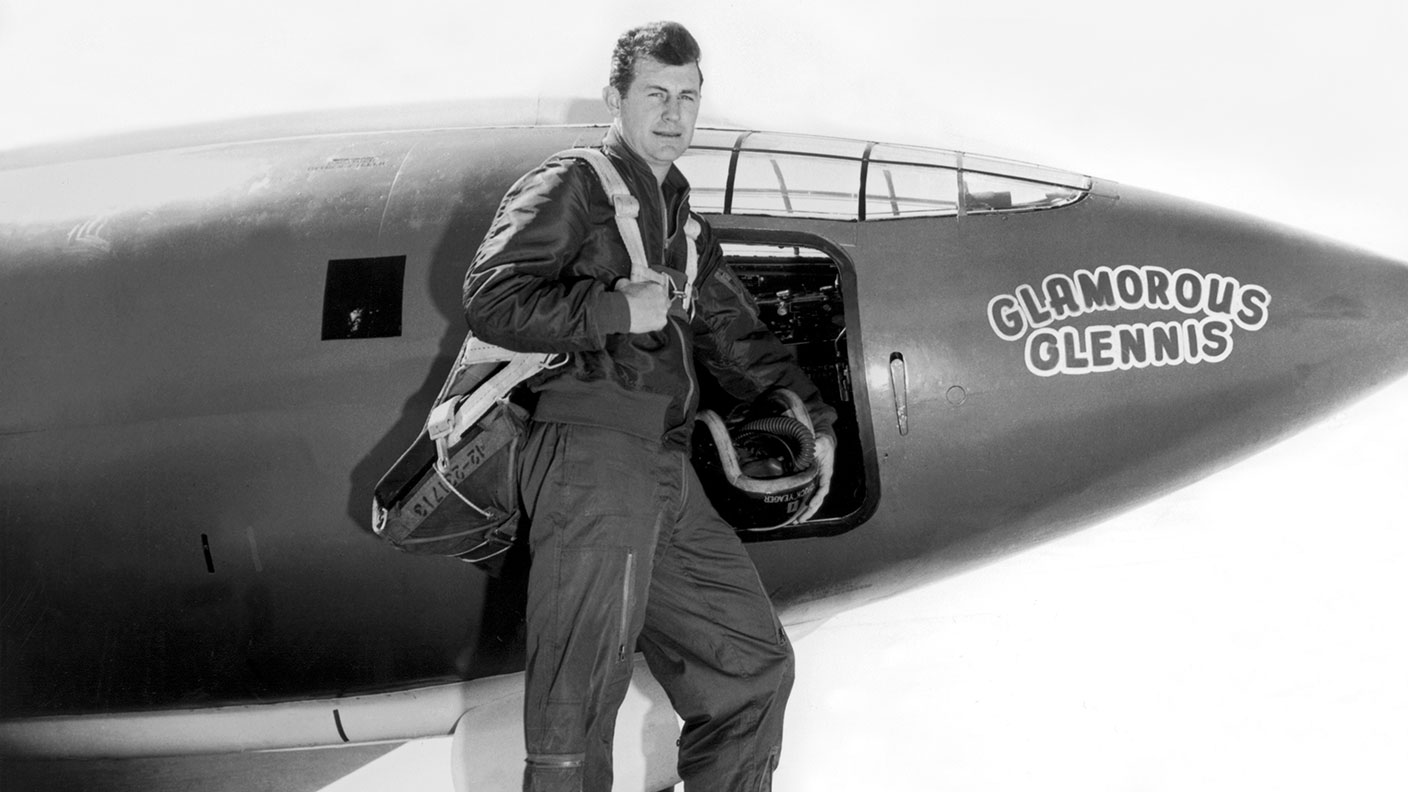14 October 1947: Chuck Yeager breaks the sound barrier
On this day in 1947, the rocket-powered Bell X-1 – nicknamed 'Glamorous Glennis' – blasted through the sound barrier, with Chuck Yeager at the controls.


Get the latest financial news, insights and expert analysis from our award-winning MoneyWeek team, to help you understand what really matters when it comes to your finances.
You are now subscribed
Your newsletter sign-up was successful
Want to add more newsletters?

Twice daily
MoneyWeek
Get the latest financial news, insights and expert analysis from our award-winning MoneyWeek team, to help you understand what really matters when it comes to your finances.

Four times a week
Look After My Bills
Sign up to our free money-saving newsletter, filled with the latest news and expert advice to help you find the best tips and deals for managing your bills. Start saving today!
Could an aeroplane stand up to the stresses of flying faster than the speed of sound? Could a man, for that matter?
American fighter ace Charles Chuck' Yeager was determined to prove that they could. He volunteered to fly a rocket plane' the Bell X-1 faster than anyone had ever done before. And he did it with two broken ribs.
Two days before the big flight, Yeager had been thrown from his horse. Fearing he would be banned from flying, he hid his injuries, telling only the flight engineer, Jack Ridley. Ridley fashioned a special handle from a broomstick allowing Yeager to pull the cockpit door shut and lock it.
MoneyWeek
Subscribe to MoneyWeek today and get your first six magazine issues absolutely FREE

Sign up to Money Morning
Don't miss the latest investment and personal finances news, market analysis, plus money-saving tips with our free twice-daily newsletter
Don't miss the latest investment and personal finances news, market analysis, plus money-saving tips with our free twice-daily newsletter
On 14 October 1947, a B-29 Superfortress took off, carrying Chuck Yeager and the X-1, which Yeager had named Glamorous Glennis' after his wife. Once the bomber had reached 23,000 feet, the X-1, with Yeager at the controls, was released.
Yeager fired all four engine chambers and the X-1 roared to life, climbed to 43,000 feet, and accelerated toMach 1.06. Chuck Yeager became officially the first person to break the sound barrier.
The press went wild once news of the daring feat had been declassified the following summer. Yeager was celebrated as "the fastest man alive" and was awarded several prizes for the achievement.
Five years later, Yeager served as the wingman for the fastest woman alive', when Jackie Cochran flew faster than the speed of sound in 1953.
Today, the X-1 is on display at the Smithsonian's National Air and Space Museum in Washington DC. Chuck Yeager, aged 97, still lives under the same Californian sky in which he flew into history.
Get the latest financial news, insights and expert analysis from our award-winning MoneyWeek team, to help you understand what really matters when it comes to your finances.

-
 Should you buy an active ETF?
Should you buy an active ETF?ETFs are often mischaracterised as passive products, but they can be a convenient way to add active management to your portfolio
-
 Power up your pension before 5 April – easy ways to save before the tax year end
Power up your pension before 5 April – easy ways to save before the tax year endWith the end of the tax year looming, pension savers currently have a window to review and maximise what’s going into their retirement funds – we look at how
-
 31 August 1957: the Federation of Malaya declares independence from the UK
31 August 1957: the Federation of Malaya declares independence from the UKFeatures On this day in 1957, after ten years of preparation, the Federation of Malaya became an independent nation.
-
 13 April 1960: the first satellite navigation system is launched
13 April 1960: the first satellite navigation system is launchedFeatures On this day in 1960, Nasa sent the Transit 1B satellite into orbit to provide positioning for the US Navy’s fleet of Polaris ballistic missile submarines.
-
 9 April 1838: National Gallery opens in Trafalgar Square
9 April 1838: National Gallery opens in Trafalgar SquareFeatures On this day in 1838, William Wilkins’ new National Gallery building in Trafalgar Square opened to the public.
-
3 March 1962: British Antarctic Territory is created
Features On this day in 1962, Britain formed the British Antarctic Territory administered from the Falkland Islands.
-
10 March 2000: the dotcom bubble peaks
Features Tech mania fanned by the dawning of the internet age inflated the dotcom bubble to maximum extent, on this day in 2000.
-
9 March 1776: Adam Smith publishes 'The Wealth of Nations'
Features On this day in 1776, Adam Smith, the “father of modern economics”, published his hugely influential book The Wealth of Nations.
-
 8 March 1817: the New York Stock Exchange is formed
8 March 1817: the New York Stock Exchange is formedFeatures On this day in 1817, a group of brokers moved out of a New York coffee house to form what would become the biggest stock exchange in the world.
-
7 March 1969: Queen Elizabeth II officially opens the Victoria Line
Features On this day in 1969, Queen Elizabeth II took only her second trip on the tube to officially open the underground’s newest line – the Victoria Line.